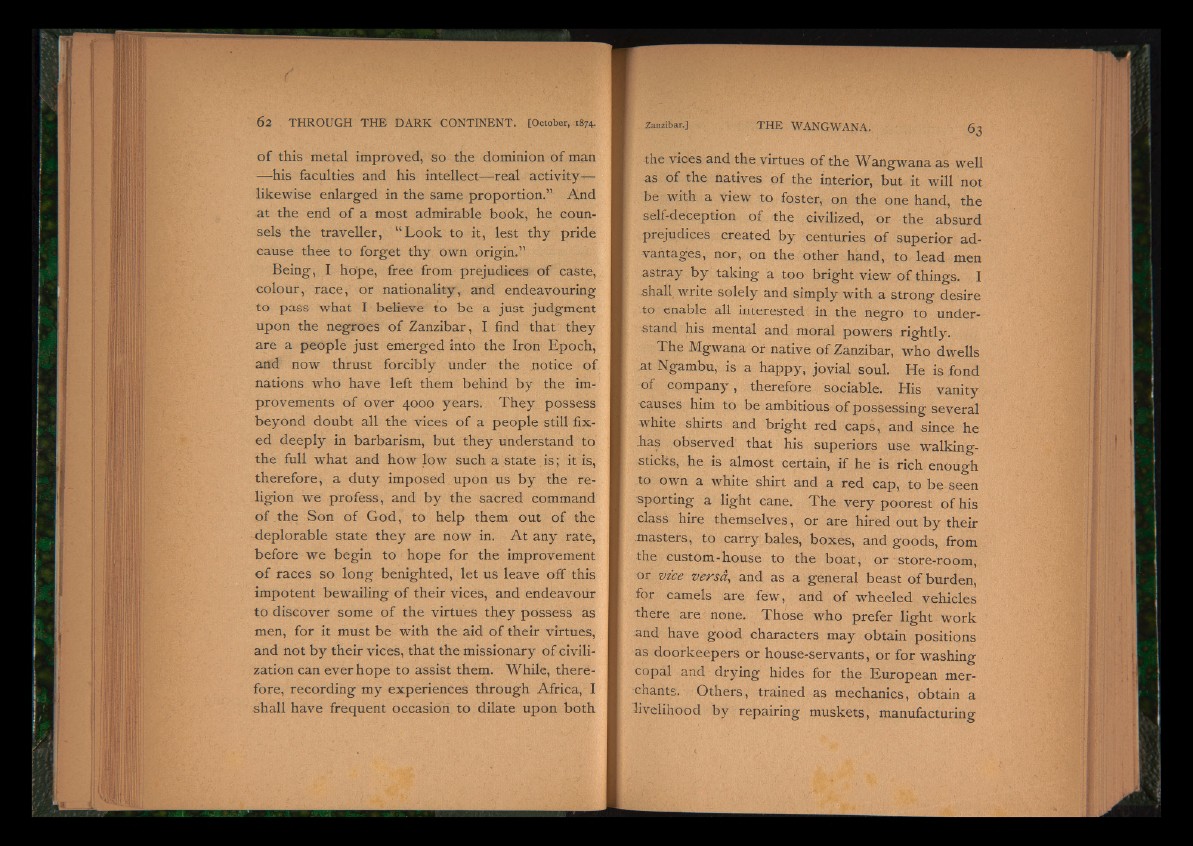
o f this metal improved, so the dominion o f man
— his faculties and his intellect— real activity—
likewise enlarged in the same proportion.” And
at the end o f a most admirable book, he counsels
the traveller, “ L o o k to it, lest th y pride
cause thee to forget thy own origin.”
Being, I hope, free from prejudices o f caste,
colour, race, or nationality, and endeavouring
to pass what I believe to be a just judgment
upon the negroes o f Zanzibar, I find that they
are a people just emerged into the Iron Epoch,
and now thrust forcibly under the notice o f
nations who have left them behind b y the improvements
o f over 4000 years. T h e y possess
beyond doubt all the vices o f a people still fixed
deeply in barbarism, but they understand to
the full what and how low such a state is ; it is,
therefore, a duty imposed upon us b y the religion
we profess, and b y the sacred command
o f the Son o f God , to help them out o f the
deplorable state they are now in. A t any rate,
before we begin to hope for the improvement
o f races so long benighted, let us leave off this
impotent bewailing o f their vices, and endeavour
to discover some o f the virtues they possess as
men, for it must be with the aid o f their virtues,
and not b y their vices, that the missionary o f civilization
can ever hope to assist them. While, therefore,
recording my experiences through Africa, I
shall have frequent occasion to dilate upon both
the vices and the virtues o f the Wangwana as well
as o f the natives o f the interior, b u t it will not
be with a view to foster, on the one hand, the
self-deception o f the civilized, or the absurd
prejudices created b y centuries o f superior advantages,
nor, on the other hand, to lead men
astray b y taking a too bright view o f things. I
shall write solely and simply with a strong desire
to enable all interested in the negro to understand
his mental and moral powers rightly.
The Mgwana o f native o f Zanzibar, who dwells
a t Ngambu, is a happy, jovial soul. He is fond
o f company, therefore sociable. His vanity
causes him to be ambitious o f possessing several
white shirts and bright red caps, and since he
.has observed that his superiors use walking-
sticks, he is almost ceftain, if he is rich enough
to own a white shirt and a red cap, to be seen
sporting a light cane. The v e ry poorest o f his
class hire themselves, or are hired out b y their
masters, to carry bales, boxes, and goods, from
the custom-house to the boat, or store-room,
or vice versa, and as a general beast o f burden,
for camels are few, arid o f wheeled vehicles
there are none. Those who prefer light work
and have good characters may obtain positions
as doorkeepers or house-servants, or for washing
copal and drying hides for the European merchants.
Others, trained as mechanics, obtain a
livelihood by repairing muskets, manufacturing